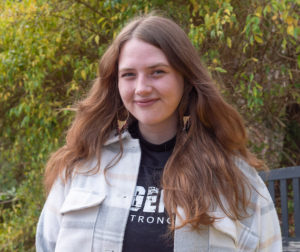Michele Graveline and Kayla Bernard, Indigenous Student Advisors at Dalhousie
Michele Graveline (she/her) grew up in a Métis community within Treaty 5 in Northern Manitoba and relocated to Mi’kma’ki in 1995. She has been supporting Indigenous students in this territory since 2009, first in public schools and starting in 2017, at Dalhousie. Michele can be reached at mgraveline@dal.ca.
Kayla Bernard grew up in the Mi’kmaq community of Sipekne’katik First Nations, and now identifies as an urbanized Indigenous person due to the time spent in her new home of Kjipuktuk (Halifax). Kayla can be reached at kayla.bernard@dal.ca.
Dalhousie’s Indigenous Student Centre is also open to students studying at King’s. The centre has an Indigenous Student Advisor available to meet with, and support student, as well as a computer lab for students to use. Email isc@dal.ca., call 902-494-8863 or drop by the centre at 1321 Edward St., Halifax.
Indigenous Student Centre at Dalhousie
The Mi’kmaw Native Friendship Centre
The Mi’kmaw Native Friendship Centre provides an array of cultural, educational, family support and health and wellness services to the urban Indigenous community. They also offer support for employment and housing services.
2021 Brunswick Street, Suite 209,
Halifax, Nova Scotia,
B3K 2Y5
902-420-1576
Wje’winen Health Centre
This is a primary care clinic that provides culturally relevant care to members of the urban Indigenous community in Halifax Regional Municipality. Students can access this as an alternative to Dalhousie Student Health and Wellness, but must provide proof of First Nations status or association with a band, tribal council or Indigenous community. To make an appointment call 902-406-0851.
Native Alcohol and Drug Abuse Counselling Association
NADACA offers culturally-specific addictions counselling, treatment centres and online wellness programs for Indigenous people living in Nova Scotia. Individuals must provide proof of First Nations status or proof of association with a band in order to access services. Call 1-866-588-5954.
Tawaak Housing Association
The Tawaak Housing Association works with government agencies to assist urban Indigenous households to obtain affordable and adequate shelter. Income is taken into account when determining eligibility and cost of house.
Hope for Wellness Helpline
The helpline provides free, 24/7 access to culturally-relevant and trauma-informed counselling services. Available in some Indigenous languages, as well as English and French. Online chat is also available. Call 1-855-242-3310.
MMIWG Crisis Line
Provides support to individuals impacted by the issue of Missing and Murdered Indigenous Women and Girls. Call 1-844-413-6649
Crisis Support
Residential School Survivor Support Line: 1-866-925-4419
First Nations and Inuit Hope for Wellness 24/7 Help Line: 1-855-242-3310
Emotional, cultural and professional support services are also available to Survivors and their families through the Indian Residential Schools Resolution Health Support Program. Services can be accessed on an individual, family or group basis. Nova Scotia, New Brunswick, Prince Edward Island, Newfoundland and Labrador: 1-866-414-8111
